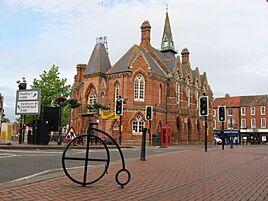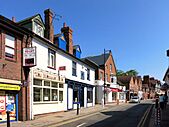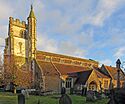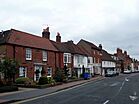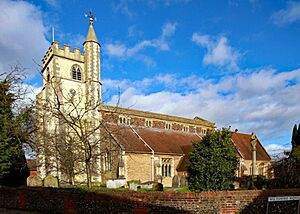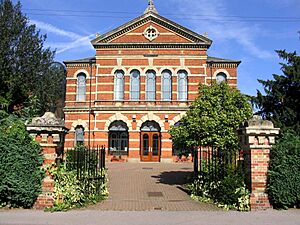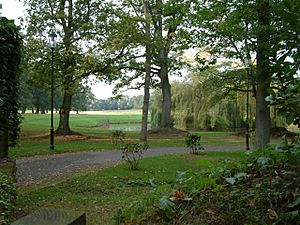Wokingham facts for kids
Quick facts for kids Wokingham |
|
|---|---|
| Market town and civil parish | |
|
Clockwise from top: Wokingham town hall, Denmark Street, Rose Street, All Saint's & St Paul's churches |
|
| Area | 0.9 sq mi (2.3 km2) |
| Population | 38,284 (Parish, 2021) 50,325 (Built up area, 2021) |
| OS grid reference | SU8068 |
| • London | 39 mi (63 km) ENE |
| Civil parish |
|
| Unitary authority |
|
| Ceremonial county | |
| Region | |
| Country | England |
| Sovereign state | United Kingdom |
| Post town | WOKINGHAM |
| Postcode district | RG40, RG41 |
| Dialling code | 0118 |
| Police | Thames Valley |
| Fire | Royal Berkshire |
| Ambulance | South Central |
| EU Parliament | South East England |
| UK Parliament |
|
| Website | Wokingham Town Council |
Wokingham is a lively market town and civil parish in Berkshire, England. It's about 37 miles (60 km) west of London. The town is also 7 miles (11 km) southeast of Reading and 4 miles (6 km) west of Bracknell. Wokingham is the main centre for the wider Borough of Wokingham. In 2021, the town parish had about 38,284 people living there. The larger built-up area had around 50,325 residents.
Contents
History of Wokingham
The name Wokingham means 'Wocca's people's home'. Wocca was likely an Anglo-Saxon leader. He might have also owned land in other nearby places. In Victorian times, the name was sometimes called Oakingham. Because of this, the town's symbol is an acorn with oak leaves.
Wokingham is built on land that was once a sea area long ago. The town was allowed to hold a market starting in 1219. This helped Wokingham grow a lot. The Bishop of Salisbury played a big part in the town's early development. He created roads and plots of land for people to rent.
From the 1300s to the 1500s, Wokingham was famous for making bells. These bells were sent to many churches in the South of England. During the Tudor period, Wokingham was also known for making silk. You can still see some of the old houses where people worked on these crafts in Rose Street.
During the English Civil War in 1643–44, Wokingham was often attacked. Both sides would steal animals and goods. More than 30 buildings were burned down, which was nearly 20% of the town. It took until the early 1700s for Wokingham to fully recover.
Old Traditions
Wokingham was once known for a tradition called bull-baiting. In 1661, a man named George Staverton left money in his will for two bulls to be brought to the Market Place each year. Dogs would then be set on the bulls on December 21st. People would come from far away to watch this dangerous event. The bulls were eventually killed, and their meat and leather were given to the poor. This practice was stopped by the town in 1821. Bull-baiting was finally banned by law in 1833.
In 1723, a law called the 'Black Act' was passed. It was named after a group of people called the 'Wokingham Blacks'. They caused trouble in the area. This law made it illegal to cover your face while doing certain actions.
Over time, Wokingham's main industries changed. Brick-making used to be important. Now, the town is known for software development, light engineering, and service industries. The number of people living in Wokingham has also grown a lot.
How Wokingham is Governed
Wokingham has two levels of local government. These are the Wokingham Town Council and the Wokingham Borough Council. The Town Council is based at the Wokingham Town Hall. This building was built in 1860. The Borough Council has its main office at Shute End, also in the town.
Wokingham is part of a larger area called the Wokingham constituency. This area chooses a person to represent them in the UK Parliament. This person is called a MP. The current MP for Wokingham is Clive Jones. He is from the Liberal Democrat party.
How Wokingham's Government Changed
Wokingham was historically part of a larger area called Sonning. Over time, Wokingham became its own separate area. Its church, All Saints, was built in the 1300s.
The town also had its own local government for a long time. The first official document allowing Wokingham to govern itself was given by Queen Elizabeth I in 1583.
In 1885, Wokingham became a municipal borough. This meant it had its own local council with more powers. The area of the town was officially defined. In 1974, the municipal borough of Wokingham was changed. It joined with the surrounding rural area to form the new non-metropolitan district called Wokingham. This new district council took over many local services. In 1998, the Wokingham District Council became a unitary authority. This means it handles both local and county-level services.
Geography and Growth
Wokingham is located near the Emm Brook in the Loddon Valley. It's in central Berkshire, about 39 miles (63 km) west of central London. The town is between the larger towns of Reading and Bracknell. It used to be on the edge of Windsor Forest. The soil here is good for farming, with sand and gravel underneath.
Wokingham has a town centre. From there, homes spread out in all directions. Some of these areas include Woosehill to the west and Emmbrook to the northwest. Other areas are Dowlesgreen, Norreys, Keephatch, and Bean Oak to the east. To the south are Wescott and Eastheath.
Wokingham has grown a lot since the mid-1900s. Areas like Woosehill and Dowlesgreen were built on farmland in the 1960s and 1970s. Keephatch was built in the early 1990s. The Norreys Estate was built in the 1960s. However, Norreys Avenue is older, built in the late 1940s for people needing homes after the Second World War.
The council has plans to improve the town centre. This includes new shops, places for fun, homes, parking, and open spaces. There are also plans for new roads and housing projects around the town. For example, the railway station area has been redeveloped. New homes are being built to the north-east and south-east of Wokingham.
The Wokingham built-up area now includes parts of nearby villages. These include Finchampstead and Barkham.
Getting Around Wokingham
The A329(M) motorway is east of Wokingham. It connects the town to Reading and the wider motorway system. You can get to the M4 from here. The A329(M) also turns into the A322, which goes to Bracknell and the M3.
Wokingham railway station is an important train stop. It's where two train lines meet: the Waterloo to Reading line and the North Downs Line. You can catch trains from South Western Railway and Great Western Railway here.
Most local buses are run by Thames Valley Buses. However, buses from Wokingham to Reading and Bracknell are run by Reading Buses. There's also a special bus for Reading FC football matches.
Important Places and Groups
Charities
- The Lucas Hospital: This place was founded in 1663. It provided homes for elderly men from nearby areas.
- Wokingham United Charities: This group helps people in Wokingham. They give money to those in need and provide sheltered accommodation.
Churches
- All Saints' Church (Church of England): This is a very old and historic building. It was first built around 1180.
- Corpus Christi Catholic Church
- St. Paul's Church (Church of England): Built in 1864.
- Wokingham Baptist Church
- Wokingham Methodist Church
- Christ Church Wokingham (Church of England): This church meets in different places, not a single building.
- Woosehill Community Church
- Norreys Church
- Kings Church Wokingham
Old Manors
- Evendon's Manor
- Ashridge Manor (now in Hurst, Berkshire)
- Beche's Manor (burned down in 1953)
- Buckhurst Manor (now St. Anne's Manor)
- Norreys' Manor (no longer standing, now Norreys Avenue)
Education in Wokingham
Wokingham has several schools for different age groups.
Secondary Schools
There are four state secondary schools in Wokingham:
- The Emmbrook School: A school for both boys and girls.
- St Crispin's School: Also a school for both boys and girls.
- The Forest School: A mixed-sex school located in the nearby village of Winnersh.
- The Holt School: A school specifically for girls.
Private Schools
- Holme Grange School: For boys and girls aged 3 to 16 years.
- Luckley House School: For girls aged 11 to 18.
Junior School
Westende Junior School is for boys and girls aged seven to eleven. It's located near the town centre. Most children at Westende come from the nearby Wescott Infant School. The school also has a special resource called 'The Acorns' for students with autism spectrum disorders (ASD).
Media
The local newspaper for Wokingham is Wokingham Today. It is also available online.
Wokingham in Stories and Films
Literature
In the 1700s, a famous poem called the Ballad of Molly Mogg was written in Wokingham. Molly was a barmaid at the old Rose Inn. Famous writers like Alexander Pope were stuck at the inn during a storm. They wrote the poem about Molly to pass the time.
Wokingham is also the setting for the 2019 novel Nietzsche and the Burbs by Lars Iyer.
The character of Tom the chimney sweep in Charles Kingsley's classic children's story The Water Babies was based on a real boy from Wokingham named James Seaward. He was a boy sweep in Victorian times. Later in life, James Seaward became an important local figure. In 1999, Wokingham got its first public sculpture, which shows the Water Babies.
Film
The 1971 film See No Evil (also called Blind Terror) was filmed in Wokingham. Some scenes were shot at the Wokingham railway station. Parts of the ITV show Primeval were also filmed at the Red Lion pub in Wokingham.
Sports and Fun in Wokingham
Wokingham has many places for sports and leisure:
- There are public parks like Cantley Park, Chestnut Park, and Elms Field.
- Holt Copse & Joel Park is a special local nature reserve.
- The council offers leisure centres like the Carnival Hub and St. Crispin's Sports Centre.
- There is a King George V Playing Field behind St. Crispin's.
- The local football team is Wokingham Town F.C..
- The Wokingham Half Marathon race happens every February.
- Wokingham Library is now located in the Carnival Hub leisure centre.
- Wokingham Cricket Club, founded in 1825, moved to a new ground in Sindlesham in 2012.
- The Wokingham Music, Food & Drink Festival takes place every August. It features local music, food, and drinks.
- Wokingham Open Air Cinema shows films outdoors before the Wokingham Festival.
Twin Towns
Wokingham has special friendships with two towns in other countries:
- Erftstadt in Germany
- Viry-Châtillon in France
Famous People from Wokingham
Many notable people have connections to Wokingham:
- Matt Allwright, TV presenter
- Luke Bedford, composer
- Dick Francis, writer
- Nicholas Hoult, actor, known for About a Boy and Skins
- Daniel Howell, YouTuber and author
- Steven Lewington, professional wrestler
- Henry Lucas, who founded a special professorship at the University of Cambridge
- Anna Watkins, Olympic gold medallist in rowing
- Jason Watkins, actor
- Will Young, singer and winner of Pop Idol
See also
 In Spanish: Wokingham para niños
In Spanish: Wokingham para niños
 | Misty Copeland |
 | Raven Wilkinson |
 | Debra Austin |
 | Aesha Ash |


